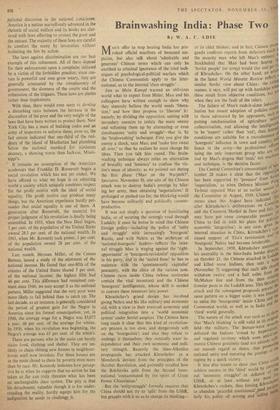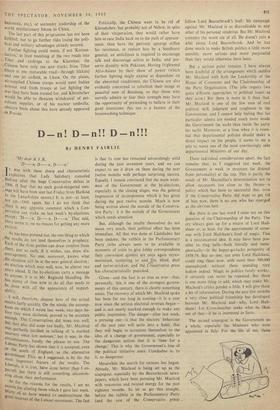Brainwashing India : Phase Twi
By W. A. C . ADZE MAO's offer to stop beating India has pro- voked official reactions of bemused sus- picion, but also talk about 'admirable and generous' Chinese terms which can only be ascribed to criminal ignorance of the tried tech- niques of psychological-political warfare which the Chinese Communists apply to the inter- national, as to the internal 'class struggle.'
Just as Mein Kampf warned an oblivious world what to expect from Hitler, Mao and his colleagues have written enough to show why they sincerely believe the world needs 'libera- tion,' and how they propose to 'liberate' it: namely, by dividing the opposition, uniting with secondary enemies to isolate the main enemy and softening them up by alternating or even simultaneous 'unity and struggle'—that is, by the 'brainwashing' technique. First you give the enemy a shock, says Mao, and 'make him sweat all over,' so that he realises he must change his ideas. Then you talk him round. The brain- washing technique always relies on alternation of brutality and 'leniency' to confuse the vic- tim's sense of identity; as we pointed out during the first phase (Mao on the Warpath?', Spectator, November 9), one aim of the Chinese attack was to destroy India's prestige by blitz- ing her army, then obtaining 'negotiations.' If prolonged or pushed too far, the blitzkrieg would have become militarily and politically counter- productive.
It was not simply a question of humiliating India, or of securing the strategic road through Ladakh; it must be borne in mind that Chinese foreign policy—including the policy of 'unity and struggle' with increasingly 'bourgeois' Russia, and with Nehru as the archetype of `national-bourgeois' leaders—reflects the inter- nal struggle Mao is waging against the 'right- opportunist' or 'bourgeois-revisionist' opposition in his party, And in the 'united front' he has to maintain with the 'spontaneously capitalist' peasantry, with the elites of the various non- Chinese races inside China (whose territories contain the vital resources) and the Chinese 'bourgeois' intelligentsia, whose skill is needed to convert these resources into power.
Khrushchev's grand design has involved giving Nehru and his like military and economic aid, with a view to their eventual economic and political integration into a `world economic system' under Soviet auspices. The Chinese have long made it clear that this kind of revolution- ary process is too slow, and dangerously soft on the 'bourgeoisie'; and also they refuse to undergo it themselves; they naturally want in- dependence and their own economic and mili- tary strength. Recently the Sino-Albanian propaganda has attacked Khrushchev as a Menshevik deviant from the principles of the October Revolution, and pointedly recalled how the Bolsheviks split from the Second Inter- national 'contaminated by the spirit of Great Power Chauvinism.'
But the 'unity-struggle' formula requires that China should not try to 'split' from the USSR, but grapple with it so as to chance its thinkinn- or its chief thinker; and in fact, Chinese propa ganda confirms reports from defectors (such a' the security man who left Mao's embassy If Stockholm) that Mao had been hoping 01.! `Soviet people' (or army) would rise and gel lie of Khrushchev. On the other hand, an artii in the latest World Marxist Review reflects a similar Soviet view about China: the wiling masses, it says, will put up with hardships when these result from objective conditions, but and when they are the fault of the rulers. The failure of Mao's rush-it-alone industrial- isation has meant adoption of policies sionl3r to those advocated by his opponents, such 35 putting mechanisation of agriculture before collectivisation, and allowing the intelligentsia al to be 'expert' rather than 'red'; thus1 draern 4 conditions arc suitable for a recrudescence( `bourgeois' influence in town and country and hence in the army—the professional 00;er,s, being the only important group who are stin the Committee in August, 1959. Chin( not machines .se 51"1,,,le, tied by Mao's dogma that 'man,' and technique, is the decisive factor. The Central Committee's communique Of SPY tember 28 makes it clear that the oppasitieft has been supported by 'pressure' from r Sev,let `imperialism,' as when Defence Minister rgf Te-huai opposed Mao at an earlier si ,ssion,',°` meths since this August have indicated 113' after Khrushchev's ' deliberations on Cornee'ri and the Common Market in June and JulY.11ie on October 21, the Chinese attacked in pressure ir dada may have put some comparable politie.er China to fall in with his plans for economic `integration'; in any case, given the internal situation in China, Khrushchev's enin; filmed support of Tito's revisionism and 9 `bourgeois' Nehru had become intolerable ., In September, 1959, Khrushchev annonne° his neutrality in the Sino-India border disPt; and killed sonic Indians, then sent a side N't,,c (November 7) suggesting that each si.1 ShOljin.
withdraw twelve and a half miles fon' the existing McMahon line and from the then frontier posts in the Ladakh area. This Octnbhe's attack and the subsequent proposals present l—il atene,,, same pattern on a bigger scale; it was i and the to smite the 'bourgeoisie' inside China Communist world, as well as in India and t" third' world generally. silovi The nature of the attack was such as to 1 origini3,, that `Mao's thinking' is still valid in its field- -the military. The human-wave assan' defeated the Indians 'armed by ImPerialis° iC°11,11- and regained territory which even alit[ %.6103- monist Chinese genuinely (and not entoeor ,,,a 7 olot'" out reason) regard as theirs, thus Pr' of the national unity and restoring the prestige regime by a quick victory.,_, I could It was also meant to show that Cnal arrYillg achieve success in the 'third' world by c of 'the out `necessary struggles' in defiance need for USSR, or at least without any u _Isbell° Khrushchev's rockets, thus forcing K,01 "'1 1131. to abandon 'peaceful coexistence' (and Par la Hy hie nnliou rd a rrn in or anti aiding
Indonesia, etc.), or surrender leadership of the world revolutionary forces to China. The last part of this programme has not been fulfilled; but to go further risks losing the poli- tical and military advantages already secured.
Further fighting could mean, if not 'Korean- tsation,' at least bombing of the, two roads into Tibet and airdrops to the Khambas; the Chinese have only ten new tracks from Tibet (there is one motorable road—through Sikkim) and one jet airfield, in Lhasa. On the plains, air-supplied Chinese troops would meet Indian armour and fresh troops at last fighting the war they have been trained for, and Khrushchev would be able to threaten withdrawal of pet- roleum supplies, or of his nuclear umbrella; obscure hints about this have already appeared in Pravda.
Politically, the Chinese want to be rid of Khrushchev, but probably not of Nehru; in spite of their vituperation, they would rather have him to ease India back on to the path of appease- ment, than have the patriotic upsurge stiffen his resistance, or replace him by a Sandhurst general; an anticlimax is required to encourage talk and discourage action in India, and pre- serve disunity with Pakistan. Having frightened Afro-Asians by their show of power (which further fighting might expose as dependent on the abnormal conditions), the Chinese are also evidently concerned to refurbish their image as peaceful men of Bandung. so that those who secretly admire or fear their strength may have the opportunity of pretending to believe in their good intentions; this too is a feature of the brainwashing technique.







































 Previous page
Previous page